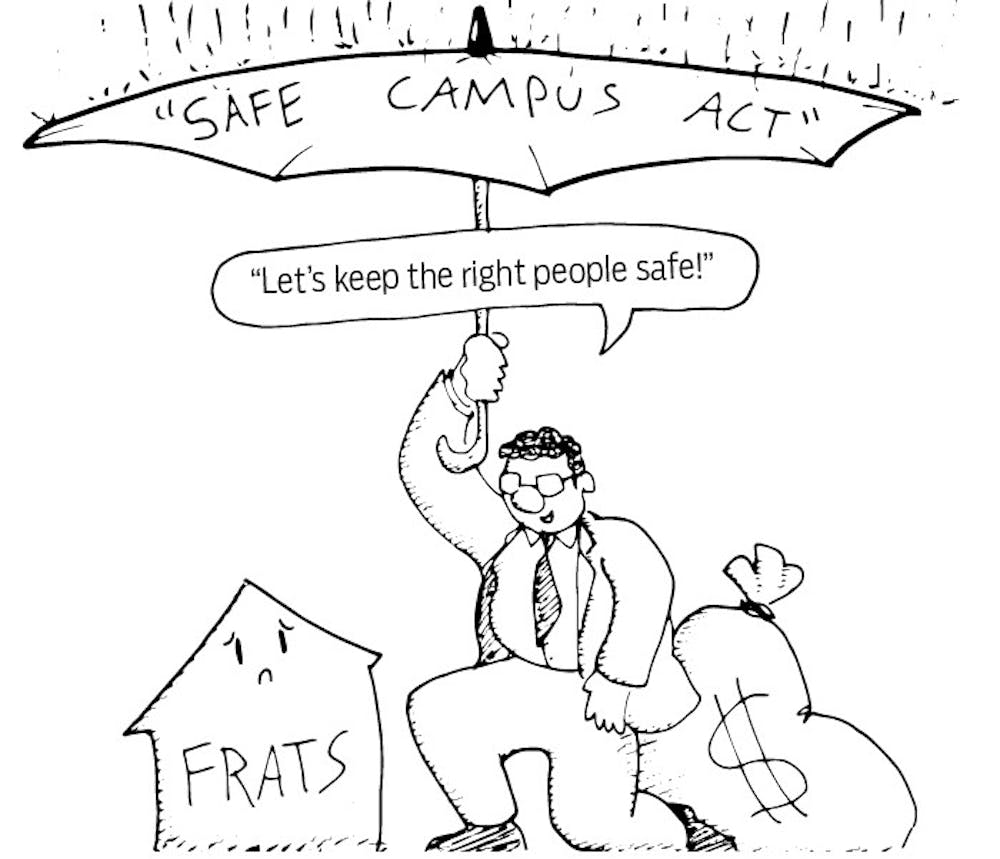When it comes to sexual assault, no one’s rooting for the terror that affects one in four women who attend college, a number supported by a survey commissioned by the Association of American Universities in 2015.
And no one’s in the corner for a crime that’s so underreported by men, the statistics are practically useless.
No one wants this heinous act to increase in frequency on college campuses across the country.
But the recent actions by a few organizations have led us to question if they intend to decrease the amount of sexual assault reports.
As you may or may not be familiar with, the “Safe Campus Act of 2015” was introduced in Congress by Rep. Matt Salmon, R-Ariz., in late July. As cited by the bill, “if an institution of higher education which is subject to this part receives a covered allegation, along with written consent to proceed from the alleged victim, the institution shall report and refer the allegation to the law enforcement agency of the unit of local government with jurisdiction to respond to such allegations.”
Essentially, the bill was formed to require police involvement in sexual assault crimes. According to the bill, a survivor may notify their institution if they don’t want the crime to be reported to the police. However, if a survivor does this, their school may not implement any punishments against the accused, meaning no suspensions and no expulsions, according to section 163.2.B of the bill.
What this bill does is tie the hands of universities from helping survivors with the red tape of legislation that would, in theory, increase reports of rape to law enforcement.
And what’s even more unnerving is the support this bill has gained from national Greek organizations.
NYmag.com reported that Senator Trent Lott, R-Miss., would begin lobbying for the Safe Campus Act after being hired by a coalition made up of the North-American Interfraternity Conference, National Panhellenic Conference, Alpha Tau Omega, Sigma Nu and Kappa Alpha Order.
The Huffington Post reported that the North-American Interfraternity Conference, which represents 74 men’s fraternities, deleted it’s web page advocating the Safe Campus Act on Monday.
While it’s unfair to claim these organizations would blatantly want to increase unreported rapes and protect its members, — many of whom are the alleged perpetrators in campus sexual assault cases — it’s impossible to ignore the implications of this bill and the money these groups have thrown at it. Lott and a group of lobbyists have accumulated about $140,000 from this coalition.
And before you believe the rhetoric the Safe Campus Act would increase reports by survivors to the police, and thus result in more convictions, you might want to look at the raw data.
According to the Rape, Abuse and Incest National Network, 32 percent of rapes are not reported to law enforcement — not surprising. But only 7 percent of these reports lead to an arrest. Three percent were sent to a prosecutor, 2 percent ended in a felony conviction and only 2 percent of rapists spent a day in jail.
It’s possible that reporting more assaults will increase the conviction rate, but the shocking results that 98 percent of rapists walk free isn’t convincing the 68 percent of non-reporting survivors to speak up.
It’s perceived by many advocacy groups that a “chilling effect” would occur on campuses across the country if this bill were to be introduced; survivors would be less inclined to come forward with allegations to colleges and universities if there are more hoops to jump through.
“We don’t force victims of other crimes to interact with police and file reports and initiate a criminal justice investigation,” Kristen Houser, chief public affairs officer for the Pennsylvania Coalition Against Rape, told the Huffington Post in regards to reports with universities.
Whatever motives these organizations have for supporting this bill, it’s imperative to understand it doesn’t support survivors but allows the accused the right of protection.
We’ve done enough harm to survivors on our campuses. This bill is the last thing they need.





